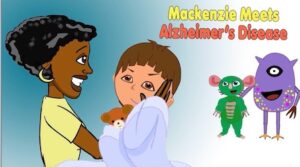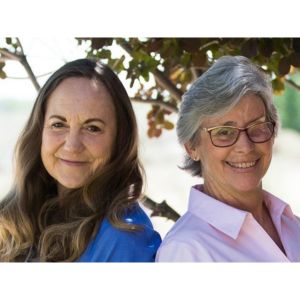Stuck in the Middle Again
 Submitted by Alder Allensworth
Submitted by Alder Allensworth
Co-Author
Mackenzie Meets Alzheimer’s Awareness Program
One of the things we hear from caregivers is that they are stuck in the middle between providing care for their loved one with Alzheimer’s, or any type of dementia, and their children.
Does this sound familiar?
Your loved one with dementia won’t eat the dinner you lovingly prepared with their favorite foods, and your children start to join in on the food strike. You are trying your best to get everyone fed and your loved one with dementia settled so that you can spend some much needed time with your children helping them with their homework.
It’s all you can do to not run away from home.
For the above scenario (not in the quick reference guide) here are three solutions based on three different stages of the disease.
Mild or Sometimes Called Early Stage
Your loved one who has dementia is just starting to exhibit some behavior changes, but is still able to function fairly well with support. Instead of forcing them to eat the dinner you so lovingly prepared, you might suggest your child and loved one who has the disease work together and create a meal to eat.
It can be peanut butter and jelly sandwiches. Simple and nutritious is always good. Set out the ingredients and supervise while they make a sandwich for themselves. Sure, it’s not as good and nutritious as the meal you prepared, but this gives both of them the opportunity to take control and be responsible.
AND, you can serve them leftovers the next day and get another dinner out of the meal you prepared.
Moderate or Sometimes Called Middle Stage
In this stage, the person with Alzheimer’s or other dementia is forgetting how to use utensils. They might know something is wrong and they are trying to cover up for their lapse of memory.
It tugs at your heart.
You might want to play an eating game such as mixing the food on their plate to create new tasty dishes.
Another idea is to pretend they are on a cooking show and they have to combine the food on their plate to make the most attractive and tasty dish possible. Have you ever wondered what peas and potatoes taste like smashed together?
Talk to them about using the utensils they have at their place setting to do this. This gives clues to your loved one on how to eat the food and makes eating fun.
If your child is old enough (12-18), they might be able to feed your loved one living with the disease. This is a healthy form of interaction for the child and loved one, helps your child feel useful, and gives you a break.
Severe or Sometimes Called Late Stage
Your loved one might not be eating much and might have forgotten how to chew or swallow. (Learn more about Dysphagia in the Dementia Map Glossary.) In this stage, it is important not to force feed them. Give them any easy to swallow foods they might like to eat such as oatmeal or sherbert.
Children might get envious that they don’t get their favorite snacking foods whenever they want them. It’s important to let the children know that because of the disease, their loved one needs to eat foods that are appealing to them to keep them healthy. Let your children know it’s important they eat foods that help them grow strong.
Many times in this Late Stage of the disease, your loved one is bed bound. It’s best to have a family meal without your loved one. Then, once the children are settled or otherwise occupied, offer food to your bed ridden loved one. Children should not feed your loved one in this Late Stage.
Mackenzie Can Help
For more resources, information, tips, and activities, check out the Mackenzie Meets Alzheimer’s Awareness Program. It can help keep you from being stuck in the middle again by helping you incorporate your children into the care of your loved one living with Alzheimer’s or any type of dementia.
There is a 25% off coupon for the Program
in our profile here on Dementia Map!
Alder Allensworth and Brenda Freed
Mackenzie Meets Alzheimer’s Awareness Program

Alder Allensworth, RN, MM cared for her mother through Alzheimer’s and her father through vascular dementia. She started her career as a music therapist working with all ages and abilities. She transitioned to becoming a hospice counselor. Alder worked with people who had Alzheimer’s and dementia at the end of life, and their families.
Brenda Freed, MA MUS is a music therapist, music teacher and singer songwriter. Brenda has taught guitar, piano and voice to students ages 4 to 83 for over 30 years. She worked in nursing homes, a university hospital where she worked with infants to geriatrics of all diagnoses, including end of life. She has extensive songwriting, video creation and recording experience, and has produced several CDs of original material. Brenda’s father died of Covid-induced dementia.
The professional and personal experiences of Alder and Brenda make them uniquely qualified to create the Mackenzie Meets Alzheimer’s Awareness Program – a multimedia toolkit to help families understand Alzheimer’s, incorporate their children into the care, and maintain a loving relationship throughout the course of the disease.

